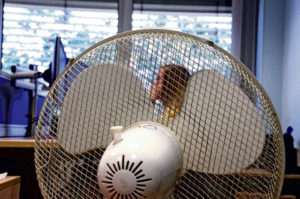It was a year ago the state of Rheinland-Pfalz recorded its highest temperature when the thermometer spiked to 104.7 F (40.4 C) July 25, 2019, on the hottest day ever in Germany.
There are specific garrison directives in place when the heat rises. On that day and one other in 2019, the garrison commander allowed employees to use administrative leave to avoid heat-related injuries.
According to garrison safety experts, once the temperature hits the 95 F (32 C) mark, leaders must start looking at ways to protect employees.

“Supervisors and commanders must be flexible when dealing with the heat in Germany,” said Herb Nold, U.S. Army Garrison Rheinland-Pfalz Safety specialist. “Heat is heat anywhere in the world. The difference is Germany, unlike most places in the United States, does not have air conditioning in the majority of its buildings, especially the old ones.”
Nold said employees and Soldiers with preexisting conditions and those who work on upper floors would feel the impact of the higher temperatures the most.
“Supervisors must have a plan,” Nold said. “It comes from both the U.S. safety regulations and the host nation contract. Some stipulations enable supervisors to allow a looser dress code, longer breaks, and other mitigating measures.”
According to the host nation contract with the U.S. Army and the U.S. Army Medical Commands, taking preventive measures will help alleviate heat-related stress.
While it may sound simple, Nold offered some tips:
- Employees stay with dressier work clothes, even when the forecast calls for high temperatures. Looser, lighter clothing can do wonders for comfort in the office.
- Letting fresh air in the office before the morning turns hot can keep an office cooler.
- Some offices can change their work hours to allow employees to come in, then leave, earlier.
- Drink lots of water.
- Government Purchase Cards can be used to buy fans. In Germany, the Directorate of Public Works must approve of individual office air conditioners. DPW noted the wiring and infrastructure in a vast majority of the garrison’s office buildings do not support the AC’s electrical workload.
Earlier this year, Col. Jason T. Edwards, USAG RP commander, signed Garrison Policy No. 33, which allows Army family housing residents to buy one air conditioner for their Baumholder Military Community home. Many of the stairwell apartments in the BMC are three or four stories.
Nold said air conditioners are not allowed in most office buildings in the garrison because the older buildings are not built to handle the electrical load multiple air conditioning units would cause.
“The main thing is, watch out for your co-workers,” Nold emphasized. “If you see someone is sweating profusely or, worse, not sweating when they should be, get them help right away. Heatstroke is very serious and can affect someone the rest of their life.”


